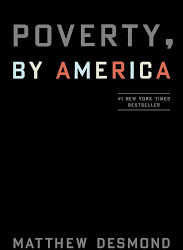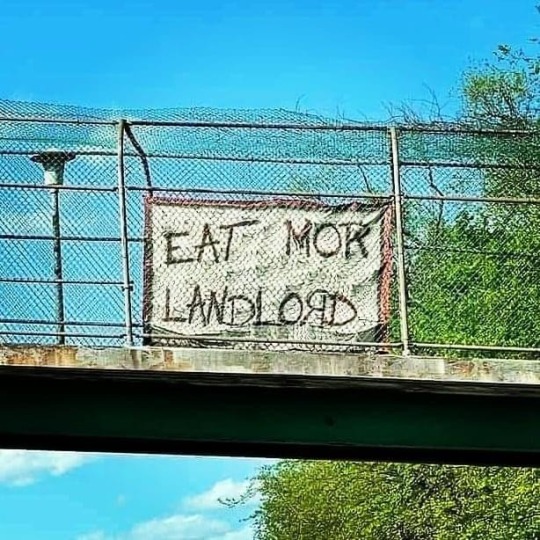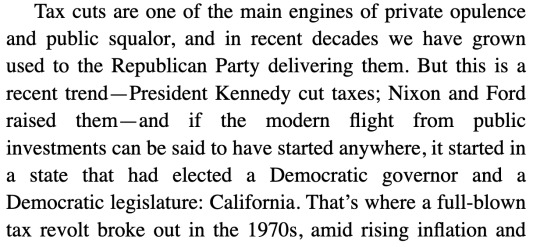#matthew desmond
Text
[“Poverty is embarrassing, shame inducing. Misery (misère), the French sociologist Eugène Buret once remarked, “is poverty felt morally.”
You feel it in the degradation rituals of the welfare office, where you are made to wait half a day for a ten-minute appointment with a caseworker who seems annoyed you showed up. You feel it when you go home to an apartment with cracked windows and cupboards full of cockroaches, an infestation the landlord blames on you. You feel it in how effortlessly poor people are omitted from movies and television shows and popular music and children’s books, erasures reminding you of your own irrelevance to wider society. You may begin to believe, in the quieter moments, the lies told about you. You avoid public places—parks, beaches, shopping districts, sporting arenas—knowing they weren’t built for you.
Poverty might consume your life, but it’s rarely embraced as an identity. It’s more socially acceptable today to disclose a mental illness than to tell someone you’re broke. When politicians propose antipoverty legislation, they say it will help “the middle class.” When social movement organizers mobilize for higher wages or housing justice, they announce that they are fighting on behalf of “working people” or “families” or “tenants” or “the many.” When the poor take to the streets, it’s usually not under the banner of poverty. There is no flag for poor rights, after all.
Poverty is diminished life and personhood. It changes how you think and prevents you from realizing your full potential. It shrinks the mental energy you can dedicate to decisions, forcing you to focus on the latest stressor—an overdue gas bill, a lost job—at the expense of everything else. When someone is shot dead, the children who live on that block perform much worse on cognitive tests in the days following the murder. The violence captures their minds. Time passes, and the effect fades until someone else is dropped.
Poverty can cause anyone to make decisions that look ill-advised and even downright stupid to those of us unbothered by scarcity. Have you ever sat in a hospital waiting room, watching the clock and praying for good news? You are there, locked on the present emergency, next to which all other concerns and responsibilities feel (and are) trivial. That experience is something like living in poverty. Behavioral scientists Sendhil Mullainathan and Eldar Shafir call this “the bandwidth tax.” “Being poor,” they write, “reduces a person’s cognitive capacity more than going a full night without sleep.” When we are preoccupied by poverty, “we have less mind to give to the rest of life.” Poverty does not just deprive people of security and comfort; it siphons off their brainpower, too.”]
matthew desmond, from poverty: by america, 2023
2K notes
·
View notes
Text
"I sit on a man's back, choking him and making him carry me, and yet assure myself and others that I am very sorry for him and wish to ease his lot by all possible means, except by getting off his back." - Count Leo Tolstoy, rich guy who knew he was the problem, quoted in Poverty by America by Matthew Desmond
34 notes
·
View notes
Link
A review of Matthew Desmond’s book Poverty, by America.
“If you count all public benefits offered by the federal government, America’s welfare state (as a share of its gross domestic product) is the second biggest in the world, after France’s,” Desmond tells us. Why doesn’t this largesse accomplish more?
For one thing, it unduly assists the affluent. That statistic about the U.S. spending almost as much as France on social welfare, he explains, is accurate only “if you include things like government-subsidized retirement benefits provided by employers, student loans and 529 college savings plans, child tax credits, and homeowner subsidies: benefits disproportionately flowing to Americans well above the poverty line.” To enjoy most of these, you need to have a well-paying job, a home that you own, and probably an accountant (and, if you’re really in clover, a money manager).
“The American government gives the most help to those who need it least,” Desmond argues. “This is the true nature of our welfare state, and it has far-reaching implications, not only for our bank accounts and poverty levels, but also for our psychology and civic spirit.” Americans who benefit from social spending in the form of, say, a mortgage-interest tax deduction don’t see themselves as recipients of governmental generosity.
61 notes
·
View notes
Text
This is who we are: the richest country on earth, with more poverty than any other advanced democracy. If America’s poor founded a country, that country would have a bigger population than Australia or Venezuela. Almost one in nine Americans—including one in eight children—live in poverty. There are more than 38 million people living in the United States who cannot afford basic necessities, and more than 108 million getting by on $55,000 a year or less, many stuck in that space between poverty and security.
Poverty, By America, Matthew Desmond
17 notes
·
View notes
Photo



Matthew Desmond, Poverty, by America
33 notes
·
View notes
Text
When my family moved to East Arlington, a suburb of Boston, after taking new jobs, we landed in a neighborhood with far fewer issues and far less joy. When the snow fell there, the neighbors cleared only their own walks, stopping abruptly at the property line.
Poverty by America by Matthew Desmond
6 notes
·
View notes
Text
Evicted, A Book Review
Has a book ever made you so uncomfortable that you wound up reading faster? Because I read this book in about a week (last year I read 14 books. I'm not one of those Booktok people that reads 5 thousand-page novels a month).
Evicted: Poverty and Profit in the American City by Matthew Desmond is a non-fiction book published in 2016 about the affordable housing crisis. More specifically, it examines the lives of several poor families living in Milwaukee, Wisconsin and tells their stories. This book examines how and why people become trapped in cycles of poverty and what constant eviction does to people physically, financially, and psychologically. It also suggests ways our wellfare system could be overhauled to alleviate this.
Time, care, and empathy was put into this research. Desmond made an effort to look at both white and Black families during his project, analyzing the racial discrimination and segregation that is still very much a part of everyday American life. The families in these stories had problems such as drug addictions, criminal records, and a history of poor choices (you know, the kinds of things Fox News likes to rant about), but still portrays them in a sympathetic light. There is one person in this book, Crystal, who was prone to erupting into fits of violence when under exreme stress due to a history of severe childhood trauma. She hurt people, but I still came away from this book firmly believing that she deserved a roof over her head.
One of the chapters that really sticks out in my mind is titled "Lobster on Food Stamps." It tells the story of a poor woman in a trailer park who spent her entire monthly allotment of food stamps on a single, indulgent seafood dinner for one. Stories like this are a very common talking point for political pundits that like to demonize poor people. But Evicted uses this woman's story to explain why this happens: when you are extremely poor, it is next to impossible to dig yourself out no matter how much you save and what choices you make. There is no way out. Genuinely. Indulging will make the pain go away, at least for today. It is, ultimately, a very human choice.
Evicted is a difficult read, emotionally. Every time I sat down to read this thing it was always "Oh, great, Arleen's getting kicked out of another place for some bullshit reason." This isn't a fun book, but it's important. I've also heard good things about Desmond's followup Poverty, by America.
Now, nonfiction can't be spoiled, so let me end this review with the last line of the book:
"No moral code or ethical principal, no piece of scripture or holy teaching, can be summoned to defend what we have allowed our country to become."
#evicted book#book review#read a book#nonfiction#matthew desmond#poverty by america#housing costs#housing is a human right
4 notes
·
View notes
Text
Poverty, By America - Matthew Desmond

Summary: Sociologist Matthew Desmond examines how the poor are kept poor in the United States.
Quote: “Poverty isn’t simply the condition of not having enough money. It’s the condition of not having enough choice and being taken advantage of because of that.”
My rating: 4.5/5.0 Goodreads: 4.32/5.0
Review: A short but targeted attack on policies and social behaviors that keep poverty such an issue in the United States. Desmond makes his points with searing language backed by clear data and personal anecdotes of those affected by poverty. He doesn’t coddle, but nor does he despair. Alongside the clearly identified problems, he offers actionable solutions.
To-read: Desmond’s book Evicted is also excellent.
4 notes
·
View notes
Text

Some of my favourite quotes from Matthew Desmond’s newest book:
“‘It is much easier in the United States to be decently dressed than it is to be decently housed, fed, or doctored.’”
“As the sociologist Gerald Davis has put it: Our grandparents had careers. Our parents had jobs. We complete tasks.”
“Many features of our society are not broken, just bifurcated. For some, a home creates wealth; for others, a home drains it. For some, access to credit extends financial power; for others, it destroys it.”
“The question that should serve as a looping incantation, the one we should ask every time we drive past a tent encampment, those tarped American slums smelling of asphalt and bodies, every time we see someone asleep on the bus, slumped over in work clothes, is simply: Who benefits? Not Why don’t you find a better job? Or Why don’t you move? Or Why don’t you stop taking out such bad loans? But Who is feeding this?”
“Things collectively shared, especially if they are shared across class and racial divides, come to be seen as lesser. In America, a clear marker of poverty is one’s reliance on public services, and a clear marker of affluence is one’s degree of distance from them…There was a time when Americans wished to be free of bosses. Now we wish to be free of bus drivers. We wish for the freedom to withdraw from the wider community and sequester ourselves in a more exclusive one, pulling further and further away from the poor until the world they inhabit becomes utterly unrecognizable to us.”
3 notes
·
View notes
Text

(From Rob Brezsny)
* * * * *
“For ten years now, I have lived under a singular monster, a hive brain with many bitter limbs. For ten years I have lived under landlords”
― Joel Golby
+
“Evictions should be the absolute last resort for landlords and not the first-choice, nuclear option. Evicting people is mostly an unnecessary exercise in power-tripping and avoidable.”
― Stewart Stafford
+
“Urban landlords quickly realized that piles of money could be made by creating slums: “maximum profits came, not from providing first-class accommodations for those who could well afford them… but from crowded slum accommodations, for those whose pennies were scarcer than the rich man’s pounds.” Beginning in the sixteenth century, slum housing would be reserved not only for outcasts, beggars, and thieves but for a large segment of the population.”
― Matthew Desmond, Evicted: Poverty and Profit in the American City
+
“The profits were staggering. In 1966, a Chicago landlord told a court that on a single property he had made $42,500 in rent but paid only $2,400 in maintenance. When accused of making excessive profits, the landlord simply replied, “That’s why I bought the building.”
― Matthew Desmond, Evicted: Poverty and Profit in the American City
29 notes
·
View notes
Text
[“The poverty debate could do more to recognize the powerful effects of rejection on a person’s self-confidence and stamina. Applying for an apartment or job and being turned down ten, twenty, forty times—it can wear you out. Theories about neighborhood selection or joblessness often assume low-income people are more or less “rational actors” who recognize trade-offs and make clear choices. The reality is that many are “exhausted settlers” who accept poor housing in a disadvantaged neighborhood or a dead-end or illicit job after becoming depleted and disheartened from trying and trying and failing and failing. The shame of rejection not only can pressure people to accept undesirable circumstances today; it can also discourage them from striving for something better tomorrow.”]
matthew desmond, from evicted: poverty and profit in the american city, 2016
#matthew desmond#history stuff#currently reading#inseparable from the sense of foreshortened future that comes with post traumatic stress
2K notes
·
View notes
Text
"Only 1 in 4 families that qualify for any kind of housing assistance (rental assistance, public housing) receive it. The waiting list for public housing in a city like L.A. is not counted in years anymore it is counted in decades. "
"The reason that waiting list is so big, is because we haven't invested deeply in housing our poorest families. And one of the reasons we don't have enough money to go around is because we have things like the mortgage interest deduction."
Matthew Desmond on The Real Cause of Poverty with Matthew Desmond - Factually! - 215
The Mortgage Interest Deduction is a tax deduction rich people get for owning a home. It is a housing subside for the wealthy.
#Matthew Desmond#Housing insecurity#poverty#mortgage interest deduction#public housing#rental assistance#wealthy#rich#tax deduction#subsides#investment
2 notes
·
View notes
Text
Poverty, By America: book discussion July 15
We'll meet on Saturday, July 15, by Zoom. We'll discuss the second half of POVERTY, BY AMERICA, by Matthew Desmond. Email us for the Zoom invitation; feel free to come if you missed the first part.

2 notes
·
View notes
Text
Still reading • • •
The Pillars of the Earth by Ken Follett 54%
Small Joys by Elvan James Mensah 62%
Red Island House by Andrea Lee 42%
Perfect Peace by Daniel Black 40 %
Poverty, by America by Matthew Desmond 15%
Black Women Writers at Work by Claudia Tate 24%
The Urgent Life by Bozoma Saint John 18%
Sweet Vengeance by Viano Oniomoh 63%
Random thoughts:
I feel so incredibly lucky to be able to read black women writers at work it’s such a magnificent experience. It’s life affirming and eye-opening and a specific look into all these incredible women writers lives and I’m learning about folks I don’t know a lot about on a person level and I love to read their thoughts and see their connections and linkages to each other. It’s incredible
Matthew Desmond is like — he’s Tim Wise of this America shit. Tim Wise with nothing but pure facts, not to say Tim Wise ain’t got facts because both of them got facts on facts! Poverty, by America has got me in its grip. It’s so good.
Red Island House is weird but also what I need sometimes. It’s such a unique and gothic sort of novel in its execution. It’s giving African gothic and im here for it.. I love the dynamic of the married couple — gorgeous, well educated Black woman who speaks multiple languages experiencing Africa moved from the US to Italy married an Italian, who built this crazy masterpiece of a house in Madagascar. It’s different, but engaging. So much going on in the town it’s giving Edwidge Danticat vibes.
Perfect Peace is traumatizing. I love Daniel Black but I’ve reached a place in this book where I’m scared for everyone involved. It’s a lot. Well-written as usual but my heart is beating outta my chest!
Small Joys is a sleeper hit. It’s so fucking good. Levels and layers to this shit good. Mensah is really making me feel like I’m in a mix of Queenie and I May Destroy You!
Pillars of the Earth — I’m loving this novel as a homestead type of novel. An anchor to come back to, it’s my long story to continually engage with when I want my brain to feel connected to a people.. a world.. something. Yo only crazy readers know what I mean by that. If you’ve ever read Harry Potter, LOTR you know what I mean by that. I get why people read long series that never end it’s like a place to stash your mind.
Urgent Life is good but boring
Sweet Vengeance sweet hot and dirty and you know what it’s fun can’t complain
Other things I’ve been reading
Girlhood by Melissa Febos
Valley of the Birdtail by Andrew Stobo Sniderman
More
Books I forgot that I was reading
Cutting for Stone by Abraham Vergese
The Liar’s Club by Mary Karr
Surrender by Bono
More

#updates#chantel’s reading diary#goodreads#currently reading#recently read#chantel's reading notes#Abraham vergese#Bozoma Saint John#Bono#Mary Karr#Ken Follett#Melissa Febos#Elvin James Mensah#Andrea Lee#Daniel Black#matthew desmond#Viano Oniomoh#claudia tate
3 notes
·
View notes
Text
A higher minimum wage is an antidepressant. It is a sleep aid. A stress reliever. Vocal segments of the American public, those with brain space to spare, seem to believe the poor should change their behavior to escape poverty. Get a better job. Stop having children. Make smarter financial decisions. In truth, it’s the other way around: Economic security leads to better choices.
Poverty, By America, Matthew Desmond
15 notes
·
View notes
Photo


Matthew Desmond, Poverty, by America
20 notes
·
View notes